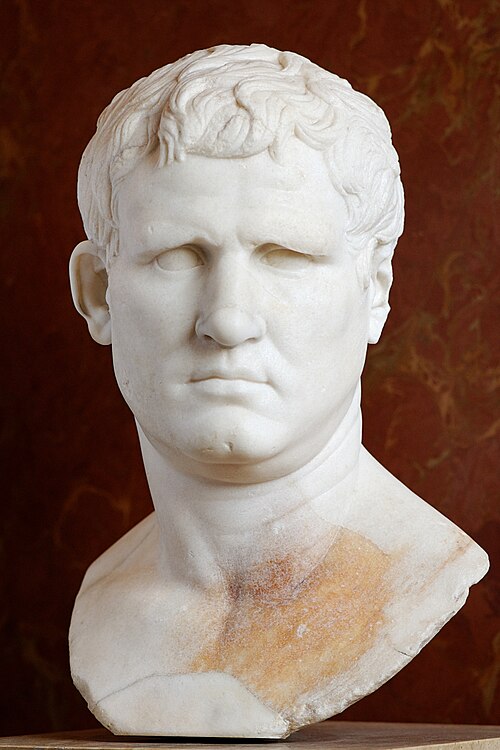Consuls
Broughton: Agrippa had probably been placed in charge in 38 of the preparation and training of a new fleet against Sextus Pompey (see 38, Triumviri B. P. C., on Octavian, and Promagistrates, on Agrippa). He spent much of the year building the protected Lucrine harbour, equipping the vessels and training the crews (a). Precisely when Agrippa also became admiral in succession to Calvisius (see Promagistrates, on Calvisius), is not certain, but it was probably early in the year. (See b) On Agrippa, see (c).
Sources (4)
-
Broughton, MRR2
- CIL 11.6673, 18; Fast. Cap., Degrassi 58f. (M. Agrippa L. f.), 135, 506f.; Fast. Mag. Vic., ibid. 282, 288; Fast. Biond., ibid. 291f.; Joseph. AJ 14.487; Dio 48, Index, and 49.4; 49.24.1; Chr. 354; Fast. Hyd.; Chr. Pasc.; Cassiod.; and on Agrippa, CIL 4.2437.
- (a) Dio 48.49-51; cf. Verg. Georg. 2.161-164, and Serv. ad loc.; Liv. Per. 128; Strabo 5.4.6; Vell. 2.79.2-3; Senec. Benef. 6.32.3; Plin. NH 36.125; Suet. Aug. 16.1; Flor. 2.18.6; Serv. Dan. on Verg. Aen. 8.682, and Serv. on 693; Cassiod. Chr. ad ann.; and on the ships and weapons, App. BC 5.106 and 118
- (b) Grant, From Imperium to Auctoritas 46, on a coin inscribed Orae [maritimae et] clas(sis) Prae(fectus).
- (c) Reinhold, Marcus Agrippa 28-35; De Lact no. 420; on Caninius, PIR² 2.92, no. 389
Broughton: Agrippa had probably been placed in charge in 38 of the preparation and training of a new fleet against Sextus Pompey (see 38, Triumviri B. P. C., on Octavian, and Promagistrates, on Agrippa). He spent much of the year building the protected Lucrine harbour, equipping the vessels and training the crews (a). Precisely when Agrippa also became admiral in succession to Calvisius (see Promagistrates, on Calvisius), is not certain, but it was probably early in the year. (See b) On Agrippa, see (c).
Sources (4)
-
Broughton, MRR2
- CIL 11.6673, 18; Fast. Cap., Degrassi 58f. (M. Agrippa L. f.), 135, 506f.; Fast. Mag. Vic., ibid. 282, 288; Fast. Biond., ibid. 291f.; Joseph. AJ 14.487; Dio 48, Index, and 49.4; 49.24.1; Chr. 354; Fast. Hyd.; Chr. Pasc.; Cassiod.; and on Agrippa, CIL 4.2437.
- (a) Dio 48.49-51; cf. Verg. Georg. 2.161-164, and Serv. ad loc.; Liv. Per. 128; Strabo 5.4.6; Vell. 2.79.2-3; Senec. Benef. 6.32.3; Plin. NH 36.125; Suet. Aug. 16.1; Flor. 2.18.6; Serv. Dan. on Verg. Aen. 8.682, and Serv. on 693; Cassiod. Chr. ad ann.; and on the ships and weapons, App. BC 5.106 and 118
- (b) Grant, From Imperium to Auctoritas 46, on a coin inscribed Orae [maritimae et] clas(sis) Prae(fectus).
- (c) Reinhold, Marcus Agrippa 28-35; De Lact no. 420; on Caninius, PIR² 2.92, no. 389
Broughton: (a), which shows that he was Agrippa's colleague in succession to Caninius. See (b).
Sources (2)
-
Broughton, MRR2
- (a) Fast. Mag. Vic., Degrassi 282, 288; Fast. Biond., ibid. 291f.; and CIL 4.2437
- (b) Degrassi 135, 506f. See PIR 3.263, no. 615; De Laet no. 358
